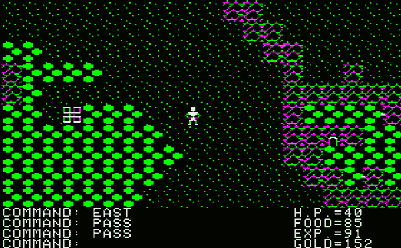
Well, I had pretty much become an expert in writing text based games, but after a while that had become a little boring so I wanted a bit more of a challenge, so imagine my surprise when looking through a catalogue of Usbourne books I discovered that they had published a book about writing Computer Roleplaying Games (CRPG), which were pretty much my favourite type of game because I could play Dungeons and Dragons on the computer. Okay, back in those days CRPGs were (and still are) pretty complex programs to create, but I really admire the fact that Usbourne managed to produce a short book to assist us children (or teenager as I was at the time) tackle something a lot more difficult.
I can still remember some of these really old games. The first ever CRPG I ever played was an incredibly basic affair using only keyboard graphics. In fact there wasn't even a dungeon to explore, but rather you would move from room to room (or wilderness location) and deal with the traps and monsters located there and then collect any treasures that you might find (you couldn't even move around the location). You even got to go up levels, but that was basically it. The other types of games that I would play were simply maze games, and one we had on our computer was called Labyrinth and was basically a maze game where you would wonder around a maze using the first-person perspective.

It wasn't long before they decided to have a monster roaming around the maze which you had to avoid as well as trying to find the exit.

Then they decided that it might be an idea to give you a weapon so that you could fight the monster.
While I am not an expert on the history of the CRPG I can still remember a few things from my childhood. There were earlier games that I can recalled but the first game that I know by name was called Wizardry where you would create your character and purchase your equipment before delving into the dungeon making your way to the lower levels so as to kill the big bad guy. All there was at this stage was a town at the entrance to the dungeon where you could visit various shops and then once you entered the dungeon you would make your way through the maze descending ever deeper until you reached the bottom. In those days there was no automapping feature so you would have to draw the maps by hand (something that I loved doing).
Another early game I remember was a game called Ultima (though the first version I played was Ultima II). Unlike Wizardry, you also had wilderness areas which you could explore, and the towns were also mapped out, as opposed to being a text based screen with options to select depending on where you wanted to go. Ultima even have a section where you would go into outer-space. However the dungeons were much the same as the dungeons in Wizardry, namely being a 3D Labyrinth with monsters. The other thing about these early games where that there was only one character, and it was only in some of the later incarnations where you could put together a whole party.

There were also other developments in these style of games, such as Sword of Fargoal and Gateway to Apshai which were more of a mix between a CRPG and an arcade game namely because the gameplay was much simpler and you used a joystick (and some keypresses) to move the character around and interact with the world. However both of those games did not use a town but was set entirely in a randomly generated dungeon (and my brother even managed to hack Sword of Fargoal to make the dungeons much easier because, well, it was written in BASIC).
As for the dungeon in this book, it is a basic underground dungeon which includes a creator, meaning that you had to build all of your adventures from scratch. It was also set up into three programs which you had to load each of them to create the dungeon, and then the character, before playing the game. Mind you, since the authors were dealing with a really complex game, the program itself had to be limited, especially when typing it into one of those computers that had an extreme limitation on memory. As for me, I do remember typing this game in, and I even worked out how to save things to disc (as opposed to tape because I never liked using tape). I even managed to work out how to add different graphics and to create a wilderness setting, especially since the authors outlined how to create different graphical characters. However, before I could advance any further beyond that I ended up losing my computer and was not able to get another one until years later when my interest in computer programming had declined.
 For writers who are new to the game and need a quick, basic crash course in fantasy writing, this book would be useful.
For writers who are new to the game and need a quick, basic crash course in fantasy writing, this book would be useful. 
 Log in with Facebook
Log in with Facebook 










